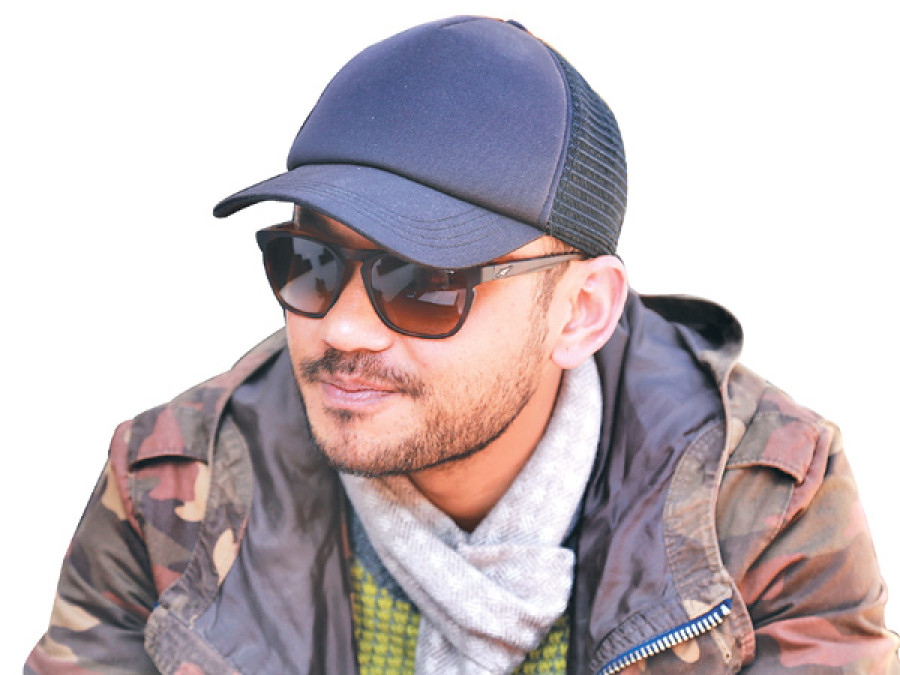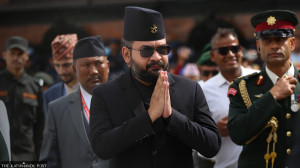Entertainment
Back to the roots
Karma, one of the most exciting young talents in the Nepali movie industry, is not one to shy away from unorthodox roles.
Karma, one of the most exciting young talents in the Nepali movie industry, is not one to shy away from unorthodox roles. From playing a timid lover in his debut, Sano Sansar, to winning accolades as a gangster in Loot, Karma has been seen in a variety of roles in his still-budding acting career. The recent release of his second Newari feature, Kisa Gautami, is another feather to his already colourful hat. In this interview with the Post’s Marissa Taylor, Karma talks about the Newari flick, and the scope and impact of films in different dialects in the movie industry. Excerpts:
Can you tell us more about Kisa Gautami?
Kisa Gautami is my second Newari film; the first was Patachara. The film is directed by Ramkrishna Khadgi, and features Melina Manandhar and Shiva Shrestha in crucial roles. Kisa Gautami is a story of Kisa Gautami, who was a disciple of Buddha.
The movie is mostly based on Buddha’s teachings.
How did such big names, such as Shiva Shrestha, yourself, and Melina Manandhar, come together to make a Newari movie for the second time?
Our first film, Patachara, was released in 2010. We had wanted to make a movie on Buddha and his teachings for a long time, and so Patachara was made. It didn’t take much convincing for our director to get us on board. Patachara was received quite well by the audience, and it didn’t take us much time to agree to work on Kisa Gautami as well.
As for me, I always wanted to do a Newari film, not just because I am a Newar, but for my grandmother as well. She doesn’t understand Nepali and so she has never watched any of my movies. And when opportunity came for me to do a Newari film, I jumped at it.
How difficult is it to pull off a Newari-speaking film? How fluent are you in Newari?
I speak Newari at home, so I had no problem with the dialect. I have lived with my grandmother all my life, so I have to say my Newari is pretty good.
How has the reception been so far?
Honestly speaking, there aren’t a lot of Nepalis who watch Newari movies. The language barrier is there, of course, which limits the audiences’ connection with the film. Also, the young generation are somewhat accepting Nepali films, although most prefer Hollywood and Bollywood movies, but even that is not enough for films to do well here. The Newari community have received the movie quite well though. People have been coming in from villages in buses to watch the film.
How do you think movies in different dialects such as these can be taken to the next level?
This is a religious film that talks about Buddha and his teachings, which automatically gives us a larger audience base. There are a lot of Buddhists around the world, in countries like Sri Lanka and Thailand, who can connect with the story. This is a movie that can be taken to an international level, but because of the unavailability of resources, we are not able to give it our best. Our budget is very limited. Patachara is on its way to be dubbed in Sri Lanka and even Thailand. Talks are also being held on dubbing Kisa Gautami as well.
But there are many drawbacks, of course. Technically, we are not that rich and we don’t have a strong financial standing to back us up, which often times limits our creativity. Despite all the barriers, I think we have pulled it off.
What do you think holds Nepali/Newari films from reaching their full potential?
The major problem here is the lack of an audience. Hardly five percent of our country’s population watch Nepali movies. If 500,000 people watch a movie, then movies here become a big hit, which is not great business. And if you think about the numbers that are raked in by Newari movies, it is much much less. There is very limited money invested and earned in movies, which directly affects the outcome and holds us from making better cinema.
The Nepali film industry makes around 200-250 movies a year, which is not a joke. But focus should be more on quality rather than quantity. We could progress a lot with that mentality. Other major problems we have is lack of professionalism and schooling. There is only one film school in the country, Oscar Film. Proper schooling is a must for making good films and that, sadly, is something missing here.
How do you think such movies will help keep ethnic roots alive?
When I was growing up, I remember watching two Newari films: Rajamati and Shilu, but now, if you ask any kid, they will have no clue that Newari movies are even made. Young kids don’t even know how to speak in Newari anymore. I think with these movies, we could, in a small or big way, keep our ethnicity alive. Over the years and with the influence of other traditions, we are somehow losing our identity, our ethnicity, a little by little.
Are you changing your focus from doing Nepali movies to promoting Newari films now?
I do whatever I get! Three to six months a year I am mostly focused on my plays. It’s very difficult to just do Nepali movies and sustain a living. I just go with the flow and keep myself busy.
How has the Nepali film industry been to you?
I joined the film industry out of my passion for films and my desire to change it to something better. Unfortunately, things did not go according to plan. There were many struggles that I had to go through, and at times I had to take up movies that I wasn’t proud of. But then, I also got to do movies like Loot, First Love, and Sano Sansar. It has been a long winding road.
I am also thinking of getting into production now. I think it will help me grow more in the Nepali film industry.
Do you think the film industry has grown in the time you’ve been here?
It has, definitely. It was in 2007 when I did Sano Sansar, and now it’s 2016. In the past nine years, the industry has grown at a fast pace. New talent is coming in and innovative ideas are being juggled. The industry is in a transitional phase where people are experimenting and better movies are being made.
Any new projects in the pipeline?
I have two movies, Lukamari and Helen, that awaiting released. An adaptation of The Little Prince will also be screened at Hotel Bajra, Studio 7, so rehearsals for that will be keeping me busy this year.
What else keeps you busy besides movies and theatre?
I have Attic Restaurant, which I run with my friends, at Tangal. Besides that I also have our family hotel, Hotel Heranya, which we started eight months ago. It keeps me busy too. I am also involved with Shiksha Nepal Foundation. Whenever I have free time, I travel.




 11.12°C Kathmandu
11.12°C Kathmandu









